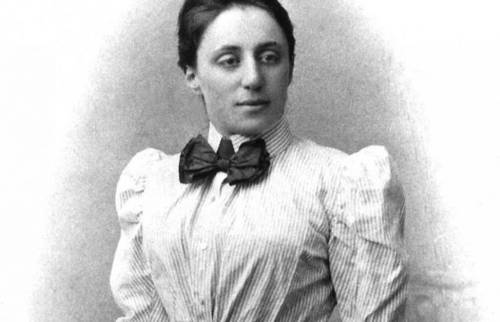
FAQ About Emmy Noether

Who was Emmy Noether?
Emmy Noether was a pioneering mathematician known for her groundbreaking contributions to abstract algebra and theoretical physics. She was born on March 23, 1882, in Erlangen, Germany, and is best recognized for Noether's Theorem, which has had a substantial impact on modern physics and mathematics.

What is Noether's Theorem?
Noether's Theorem is a fundamental principle in theoretical physics that connects symmetries and conservation laws. It states that every differentiable symmetry of the action of a physical system corresponds to a conservation law. This theorem has become a central tool in theoretical physics, particularly in the fields of particle physics and general relativity.

What are some key achievements of Emmy Noether in mathematics?
Emmy Noether made significant contributions in various areas of mathematics, particularly in the development of modern algebra. Her work laid the foundation for concepts such as commutative rings, ideals, and non-commutative algebra. She also significantly developed the theory of invariants and the structure theory of rings and algebras.

How did Emmy Noether influence modern algebra?
Emmy Noether revolutionized modern algebra through her abstract and structural approach. She introduced significant concepts, including the notion of ideals in ring theory and the ascending chain condition on ideals, which are now fundamental parts of algebraic structures. Her contributions helped to abstract key algebraic concepts, leading to the development of algebraic topology and algebraic geometry.

Where did Emmy Noether conduct her influential work?
Emmy Noether conducted much of her influential work at the University of Göttingen in Germany, a leading center for mathematical research during her time. Despite being initially barred from lecturing officially due to her gender, she later received the title of Privatdozent and became an influential teacher and researcher there.

Did Emmy Noether face any challenges during her career?
Yes, Emmy Noether faced significant challenges, primarily due to her gender. At the time, women were not readily accepted in academic positions, and she had to fight for her right to teach and conduct research. Despite these obstacles, she became a highly respected mathematician who mentored many students and made lasting contributions to her field.

How did Emmy Noether's work impact theoretical physics?
Emmy Noether's work, particularly her theorem on symmetries and conservation laws, has had a profound impact on theoretical physics. Noether's Theorem provided a systematic way to connect symmetries with conservation laws, which are fundamental in understanding physical phenomena, ranging from classical mechanics to quantum field theory.

What was Emmy Noether's influence on her students?
Emmy Noether was a highly influential mentor and teacher, inspiring a generation of mathematicians with her passion and insights. She fostered a collaborative atmosphere in her lectures and seminars, influencing many prominent mathematicians, such as Hermann Weyl and B.L. van der Waerden, who furthered her ideas and integrated them into broader mathematical frameworks.

Why was Emmy Noether's presence at Göttingen significant?
Emmy Noether's presence at the University of Göttingen was significant because it was one of the leading mathematical centers of the time. Her work there, particularly during the 1920s, solidified her reputation and allowed her to collaborate with other renowned mathematicians, profoundly influencing the development of modern algebra and theoretical physics.

How is Noetherian ideal defined in mathematical terms?
A Noetherian ideal in a ring is an ideal that satisfies the ascending chain condition, meaning there are no infinitely increasing sequences of ideals. This concept was developed through Emmy Noether's work, emphasizing the importance of such structures in understanding the properties of rings and modules in algebra.

What is the historical context of Emmy Noether's work?
Emmy Noether's work took place during a transformative period in mathematics and science at the turn of the 20th century. Despite societal barriers, she contributed significantly to significant areas in math and physics. Her work paralleled developments in quantum mechanics and relativity, framing pivotal concepts that are still essential today.

What recognition did Emmy Noether receive during her lifetime?
During her lifetime, Emmy Noether received recognition primarily within the mathematical community. She faced significant barriers due to gender discrimination, which limited her official academic titles and positions. Nevertheless, she was regarded as an outstanding mathematician and eventually secured a position as a professor in Germany, later moving to the United States.

How did Emmy Noether contribute to the field of invariant theory?
Emmy Noether made groundbreaking contributions to invariant theory, a field concerned with the properties of objects that remain unchanged under transformations. Her work in extending and generalizing classical invariant theory provided foundational concepts used in fields such as algebraic geometry, group theory, and representation theory.

What are the applications of Noether's work today?
Today, Noether's contributions are foundational in various fields, including pure mathematics, theoretical physics, and computer science. Her theorem on symmetries and conservation laws is central in physics to understand systems ranging from particle interactions to Einstein's relativity. Her algebraic concepts underpin modern computational and mathematical research, influencing algorithms, data structures, and cryptography.

What impact did Emmy Noether have on women's role in mathematics?
Emmy Noether's perseverance and success despite the gender biases of her time helped pave the way for future generations of women mathematicians. She became a role model, proving that women could excel in mathematics and inspire many young women to pursue careers in science and mathematics.

Did Emmy Noether publish any books or papers?
Yes, Emmy Noether published numerous papers that have had a lasting impact on mathematics and physics. Her most notable works include those on the theory of invariants and her groundbreaking ideas in ring theory and algebra. Some of her seminal works were published in journals, collaboratively with other leading mathematicians of her time.

What challenges did Emmy Noether face moving to the United States?
Emmy Noether moved to the United States during the rise of the Nazi regime in Germany, which targeted academics, particularly Jews. She was offered a position at Bryn Mawr College and also lectured at the Institute for Advanced Study in Princeton. Despite the challenges of adapting to a new country and academic environment, she continued her influential work and teaching.

How is Emmy Noether viewed posthumously in the mathematics community?
Posthumously, Emmy Noether is celebrated as one of the most influential mathematicians of the 20th century. Her work laid the foundations for many areas of modern mathematics and physics. She has been honored in various ways, including the naming of Noetherian rings and Noether's Theorem, reflecting her lasting legacy in the field.

How did Emmy Noether's academic career evolve over time?
Emmy Noether's academic career began with her studies at the University of Erlangen, proceeding to her influential work and teaching at the University of Göttingen, despite initial obstacles as a woman. She later moved to the United States, where she continued her research and teaching until her untimely death in 1935. Her career is marked by perseverance and significant contributions that have shaped mathematics and physics.
